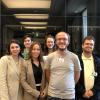News
Displaying Results 1 - 13 of 13
In North Macedonia, assisting households to make investments in green technologies not only supports climate action, but also helps them save on energy costs and improves living standards.
To support this aim, UNECE, UNDP, and IOM organized a Capacity Building Workshop in Skopje on the design of…
Critical minerals are essential for the energy transition as are intergenerational equity in resource management and the engagement of youth. With this in mind "Critical Minerals for the Sustainable Energy Transition: A Guidebook to Support Intergenerational Action” was launched today at the UNECE…
UNECE and partners are working together to support North Macedonia in its green energy transition by building capacities to finance energy efficiency (EE) and renewable energy (RE) projects.
To this end, UNECE and UNDP organized two training sessions on design and verification of energy…
In the Drina River Basin, shared mainly by Bosnia and Herzegovina, Montenegro and Serbia, working together across borders and jointly addressing water and energy challenges is a key part of effective climate action and the green transition.
As part of the Sarajevo Energy and Climate Week (25-29…
Young people across the Pan-European region are driving change for a sustainable future and will be key actors to get countries on track for the implementation of the 2030 Agenda. Their role is also integral to the huge potential of education to build knowledge, skills and understanding to tackle…
The extreme heat and drought that the region experienced this summer is a bleak reminder that current commitments under the Paris Agreement and those made last year at COP26 are nowhere near what is needed to limit global warming to below 1.5°C. Inaction is a policy choice that will lead to greater…
Building resilient energy systems to address the ongoing global energy crisis will be top of the agenda of the upcoming Sustainable Energy Week (19-23 September). Representatives from UNECE's 56 member States will discuss how to ensure energy for optimal social, economic, and environmental…
In 2022, international cooperation in energy and critical raw materials is high on the agenda. Optimal use of critical raw materials, for which demand is set to continue rising, will be crucial in delivering the green transition in energy, mobility and the digital world.
This will be in the…
COP26 was a positive step forward in the fight against climate change, but as the UN Secretary General pointed out in his comments: “it is not enough. We must accelerate climate action to keep alive the goal of limiting the global temperature rise to 1.5 degrees.” The compromise deal reflects the…
A circular economy is a paradigm which can contribute to reducing the economic, environmental and social costs of resource use, while at the same time strengthening economic competitiveness, reducing poverty, and providing better quality of life, in line with the United Nations 2030 Agenda for…
With the consequences of COVID-19 still unfolding, one area of major disruption has been to global food systems, resulting in significant increases in food loss and waste.
Today, the first ever International Day of Awareness of Food Loss and Waste, is a wake-up call. We must access and make…
Risk is a part of our everyday lives. When we wear a helmet to ride a bike, for example, we accept a small inconvenience to reduce the risk of a fall or an accident. When a homeowner decides to retrofit their house, they incur a cost to shield against an earthquake or a flood. Faced with the COVID…
Every year we lose about 14% of the food produced before it is sold, and this does not even include the food never harvested. Even more is wasted at retail and consumer levels. At the same time, over 800 million people worldwide suffer from hunger, while food loss is a major contributor to CO2…











